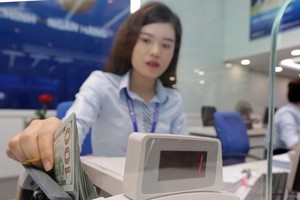This morning, in Hanoi, the State Bank of Vietnam held a press conference to announce the event "Digital Transformation in the Banking Sector 2025" with the theme "Smart Digital Ecosystem in the New Era." The event is scheduled to take place on May 29 at the headquarters of the Government Office.

According to Mr. Pham Anh Tuan, the banking sector's digital transformation efforts have yielded encouraging results. These achievements, following four years of implementing the SBV's Decision No. 810/QD-NHNN on the digital transformation plan for the banking sector up to 2025 with an orientation to 2030, have significantly contributed to the overall development of the economy.
The State Bank of Vietnam is actively strengthening the legal framework to accelerate digital transformation in the banking sector. Infrastructure supporting this shift is being prioritized for continuous investment, upgrades, and development. Many Vietnamese credit institutions now conduct over 90 percent of their transactions via digital channels. Currently, more than 87 percent of adults in Vietnam hold bank accounts, and the adoption of cashless payment methods continues to grow steadily.
In response to a question from a Sai Gon Giai Phong Newspaper reporter regarding the potential expansion of fintech entities eligible for the controlled testing mechanism in the banking sector, Director Pham Anh Tuan clarified that according to Decree No. 94/2025/ND-CP on the controlled testing mechanism, three types of solutions are currently under consideration for participation such as credit scoring, data sharing through Open APIs (Application Programming Interfaces) and peer-to-peer (P2P) lending.
Director Pham Anh Tuan revealed that through surveys and assessments of the current state of fintech companies in Vietnam, and a review of existing legal regulations, the SBV has identified potential solutions that lack a legal framework and thus require prioritized testing at this stage; as a result, the state bank has proposed the three above mentioned solutions.
However, he stressed that during the implementation of the decree, the SBV will continue to review and update new products, services, and business models within the banking sector to have precise evaluation and proposal of expanding solutions.
According to Mr. Pham Anh Tuan, in response to the banking sector's push for digital technology in product and service delivery, the SBV is strengthening its efforts to improve institutional frameworks and legal guidelines. This proactive approach aims to effectively address the increasing complexities of the cybersecurity landscape.
A significant milestone in this direction is the State Bank of Vietnam’s issuance of Circular 17/2024/TT-NHNN on June 28, 2024. For the first time, this regulation mandates the collection of biometric data from account holders. Moreover, starting July 1, 2025, customers that are organizations will only be permitted to carry out electronic transactions once their biometric information has been successfully authenticated and verified against their identification records.
However, Mr. Tuan noted that the State Bank of Vietnam has been implementing these measures selectively. Currently, of the approximately 200 million bank accounts nationwide, only around 113 million are verified and active, while the remainder are considered dormant accounts - which have been inactive for an extended period, often over a year.
The SBV intends to introduce targeted solutions to systematically identify and eliminate these inactive accounts.
Mr. Tuan also revealed that the SBV will soon issue regulations governing the use of “pseudonyms” in account names. This move is intended to prevent individuals from exploiting organizational accounts to impersonate others, thereby creating confusion for senders. Going forward, recipient accounts must display both the official account holder’s name and the corresponding account number issued by the bank—disallowing the use of misleading nicknames. For violations, the SBV is proposing fines of up to VND200 million (US$7,728).
























